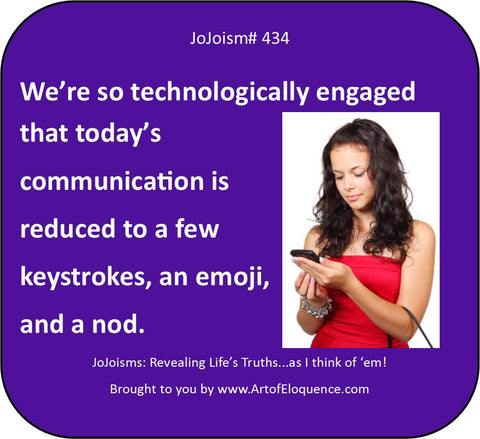
It’s one of the most pervasive and dangerous habits in America today and it's destroying your relationships! You see it all the time, but you probably never thought much about it. It's, unfortunately, at work in oral, face-to-face conversations and written exchanges over social media, text and email. I call it Conversational ADD.
Here are a few examples:
- Mary posts on Facebook asking for help for problem X only to have Jane give her solutions for problem B. Jane didn't read Mary's entire post and assumed she knew what it was about. After the confusing exchange gets heated, Jane unfriend's Mary after six years of treasured friendship.
- Tom emails a company to report some problems with his product (or service) and receives a response that had little or nothing to do with his problems. Because XYZ Company no longer has a customer service phone number (or because it's too frustrating to use), Tom is forced into a long and frustrating email exchange that leads Tom to sever his business relationship with XYZ Company and trash them on Twitter.
- Pam shares an article on a Facebook group with the preface: "This is so wrong!," but group members don't read or notice and begin chastising her for agreeing with something so horrible. She is eventually so upset she leaves the group and, with her, goes all her helpful and supportive posts she was willing to take the time to share with the group.
Here are two examples just from our own online presence:
- All Art of Eloquence product pages say: "eBook," "digital product," "download," and "you will be taken to a page where you can download"….in red-yet I receive emails asking when the order will be shipped.
- Our real estate website said things like: "$30K below market value." You wouldn’t believe the number of calls we received asking about the $30, 000 house we had for sale.
Why it happens:
- Modern life in the Information Age is BUSY! We're on Information Overload. Our microwave society has made us accustomed to being spoon-fed our information (in byte sized pieces) that don't require us to fully digest it. This makes for lazy communication and people who are often "listening to respond" instead of listening for understanding.
- Americans have become so reliant upon their cell phones that they don't look at one another while they talk anymore. They miss the nuances of body language and facial expressions that would help them get a more complete meaning.
- Because we are so busy and have the ability to get instant news right on our phone, Americans don't take the time to confirm things they read (or hear) passing along information which causes misunderstandings and arguments over issues that don't even exist.
What to do about it:
- If you don't have time to (really) listen to someone, explain why and ask if you can discuss it later when you can give them your full attention.
- Make it a point to (really) focus on what people are saying--taking into account body language, facial expressions, and tone of voice. Or, in the case of the written word, make sure to read all of the email, post or text before you respond.
- Take into account the circumstances surrounding the conversation/discussion and the character of the person speaking. If you have never known your friend to be rude, but she has recently had a traumatic event in her life, her email or social media post may come across as harsh or judgmental. However, it could just be she's had a bad day and made a poor choice of words. Take the time to confirm her meaning before you sever a decade long friendship over one sentence.
- Share this post with as many people as you know! The more we reach, the more people will take the time to communicate more effectively and the stronger our relationships will be.
Have you ever had or seen a miscommunication/argument because someone had Conversational ADD? Share your story.
